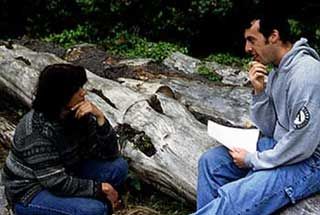

Psychiatric Survivor Oral History ProjectSubmitted by admin on Wed, 02/28/2007 - 00:27
 Oryx Cohen is Director of the the Mindfreedom Support Coalition International (SCI)'s Oral History Project. The Project involves collecting stories from psychiatric survivors, consumers, and ex-patients about their experiences in the mental health system: powerful stories of recovery, survival, resistance, and self-determination. As the title "Oral Histories" suggests, most of these stories were collected via face-to-face interviews, however, some of the published stories were edited from written e-mail or postal mail surveys. Many participants in the project have struggled through difficult emotional times, and all have suffered through psychiatric labeling and an often abusive and patronizing mental health system, yet they survived, and even thrive. There are plenty of stories circulating about people labeled with psychiatric disabilities who have "improved" or even "recovered," as a result of a strict diet of medication and perhaps a little therapy. Less is heard about people who either did not use mental health services or who now reject that system, and who have fought through tough times, survived and are now functioning well, possibly even better than ever. Much can be learned from these people about the nature of survival, recovery, and well-being. In the end, the project will have a number of presentation forms. These stories will be compiled as oral histories, or testaments to these very real experiences. They will not only be displayed on the Support Coalition web site, but archived and used as a feature for the MindFreedom Journal and for video presentations as well. Through the project, people who have experienced the psychiatric system first-hand are allowed to paint their own history, a history that often counteracts the medical model's story of progress and invention, known as the "master narrative." Reading and listening to stories of survival should also serve as a source of inspiration for people who find themselves in similarly difficult and traumatic situations. Go to the Oral History project at Support Coalition International Oryx Cohen's Masters thesis in Public Administration is a very readable, concise overview of the consumer/survivor movement and a critique of the mental health system, as well as being a quantified study of alternative recovery. Download "Psychiatric Survivor Oral Histories: Implications for Contemporary Health Policy"(202K) in PDF format. Oral History Excerpts:"I can only say I have been through a spiritual transformation. A snake slips off an old, useless piece of skin and I too discarded a part of myself, the victim.""I'm a psychiatric survivor, and I don't use that term loosely. I have been stored in warehouses labeled hospitals. I have endured weekly lectures termed therapy. I have been zapped until my brain burns white. I have been held down, tied down, put down. I have had pills forced down my throat and needles plunged into my flesh. All this to make me 'normal,' a mold I will never fit." "If you are diagnosed with schizophrenia, they talk with you like you are not there. They talk about you but not with you, but you have to hear it. But if you really want to talk, the doctors and nurses in the hospital don't have time for a conversation." "The worst part of the mental health system is that there are so many well-meaning professionals that look at you as a lesser order human being--a human being who has to be controlled, made dependent, ordered about. That is not the way to treat a person who has a tendency to be depressed and suicidal. That is the perfect way to create depressed people by making them dependent, making them different, and making them feel that they stand out in a negative way." "I know what doesn't help. What doesn't help is to have people shut you down and tell you that you're not OK and that you're pathological, you're sick, you're diseased. That's not OK and it should stop." "Looking back, I realize that I was heartbroken because I was in this horrible living situation and not getting any support or validation for how I was feeling. Instead of dealing with that, they shocked my mind. This treatment was completely and totally irrelevant to what was going on for me. What I was going through was an emotional thing and not a mental thing." "This chemical imbalance thing is about the most wacky thing I've ever heard. I don't think I've ever had a Thorazine deficiency in my life! I don't think people get Zoloft deficiencies." "Sometimes I have this tremendous sadness because I think that I might be in a much bigger place than I am now. I’m happy with my life but I’m also 51 years old. I might have been where I am now twenty years ago had all this not happened. I figure I’m here in spite of the mental health system." "When Miss Callaghan had discovered enough "symptoms," I was sent to the Bellevue children's psychiatric ward, to be officially diagnosed and to made an experimental animal for Doctor Bender. I was one of the first children to be "treated" with electric shock. I was six years old." "We, as a society, need to recognize the existence of genuine spiritual emergences. It is crucially important for us to do this, for those who pass through this process successfully and become accomplished shamans, healers and teachers, have enormous gifts and blessings to share that will benefit us all. I had been doing Buddhist meditation for a full year before that lightning bolt flashed through my mind." "To me it was about seeking truth, and ensuring that the public and the mental health system know the truth. And the truth is, you can't heal me without my cooperation, you cannot. There's no such thing as forced healing. We have to be active partners." "Why did the doctors tell me--an intelligent, gifted person--that I would never work, would never get through school, would be on medications for the rest of my life, and should stay on social security disability indefinitely? I tend to excel at whatever I do, but I was told I'd never do anything beyond a social security check." ( categories: )
|
|